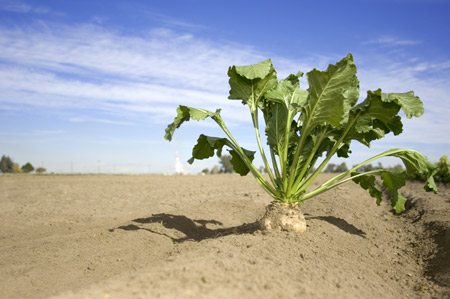Wet spring erodes beet yields in Europe
Category: Miscellaneous, Sugar
 (Reuters) – Wet spring weather has eroded beet sugar yields in much of Europe as harvesting wrapped up in a number of countries.
(Reuters) – Wet spring weather has eroded beet sugar yields in much of Europe as harvesting wrapped up in a number of countries.
The sugar beet harvest is almost over in France, with results confirming expectations of below-average yields after a difficult start to the growing season.
“At a national level, it’s a bad year,” Alexandre Quillet, president of French beet institute ITB, said. “It was really a case of adverse weather in April, May and June denting the yield potential, and we were unable to catch up later on.”
Growers’ group CGB last Friday estimated the 2013 crop at 32.9 million tonnes, down from 33.1 million last year as a fall in average yield to 84 tonnes a hectare, below the five-year mean, outweighed a rise in planted area.
However, the estimate was above the 32.5 million tonnes projected by the farm ministry last month.
“Given that we had a normal summer and a mild, wet autumn, we’re happier than we were at the end of June,” the ITB’s Quillet said.
Heavy rain in October and early November caused some delays to field work but the ITB said drier conditions in the latter half of November helped speed up the harvest.
A cold, wet spring meant crops were on average planted a week later than the five-year mean, and as a result accumulated growth delays they were unable to make up for after spring.
The CGB expected a sugar content of 17.65 percent, below an average 18 percent seen since 2000.
RUSSIAN OUTPUT
Russia’s beet output, delayed by wet weather, will be larger than expected due to a dry October and November, the Institute for Agricultural Market Studies (IKAR) said.
IKAR has raised its 2013/14 beet sugar forecast to 4.43 million tonnes, from an earlier forecast of not less than 4 million. Last year Russia produced 4.75 million tonnes.
Russia had harvested 38.6 million tonnes of beet from 98 percent of the sown area or from 0.9 million hectares as of Dec. 3, down from 42.2 million tonnes a year ago, farm ministry data showed. At the same date a year ago 1.1 million hectares were completed.
“Processing will be finished in January,” Yevgeny Ivanov, a sugar analyst at IKAR, said. “Weather in the Central, Volga and Urals regions still can bring some changes (in the forecast). It is important that a thaw does not suddenly set in.”
Russia’s beet acreage fell 20 percent this year, when farmers shifted towards planting more profitable grains.
To compensate lower beet sugar output, IKAR expects Russia to increase 2013/14 raw sugar imports to at least 700,000 tonnes from 460,000 tonnes a year ago.
Germany’s sugar beet crop is about 90 percent finished in generally good harvest conditions, but wet spring weather and reduced planted area will reduce sugar production, a spokesman for Germany’s sugar industry association WVZ said.
“Overall harvesting conditions were satisfactory but the poor weather earlier in the year has impacted the crop,” the spokesman said.
Germany’s refined sugar output from beets in the current 2013/14 season will fall to 3.58 million tonnes from 4.37 million tonnes in the 2012/13 season, the WVZ estimated.
Beet yields per hectare fell to 66.0 tonnes from 71.3 tonnes last season, the association said. Sugar content per beet fell to 17.73 percent from 18.22 percent last season.
The Italian sugar beet harvest, which finished in mid-October, produced lower than expected yields after heavy spring rains during the sowing period in March and early April, Giovanni Bellettato of the Bologna-based National Association of Beet Growers (ANB) said.
Sugar content was lower in northern growing areas than in the south due to the impact of the heavy rainfall in the north, Bellettato added.
Sugar beet harvesting in England was progressing smoothly.
“The harvest is making good progress with approximately 70 percent of the crop lifted to date,” said Colm McKay, Agriculture Director of British Sugar, the UK’s leading supplier of beet sugar.
“It is too early to predict what the final yield will be but indications to date suggest it should be broadly in line with the 5-year average.”




